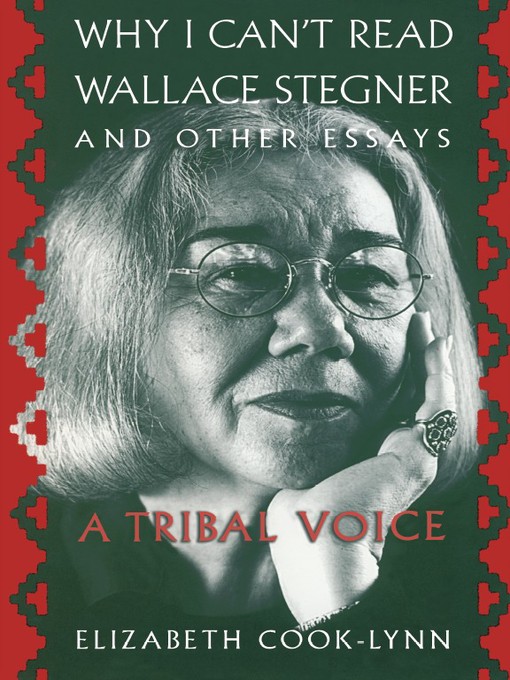This provocative collection of essays reveals the passionate voice of a Native American feminist intellectual. Elizabeth Cook-Lynn, a poet and literary scholar, grapples with issues she encountered as a Native American in academia. She asks questions of critical importance to tribal people: who is telling their stories, where does cultural authority lie, and most important, how is it possible to develop an authentic tribal literary voice within the academic community?
In the title essay, "Why I Can't Read Wallace Stegner," Cook-Lynn objects to Stegner's portrayal of the American West in his fiction, contending that no other author has been more successful in serving the interests of the nation's fantasy about itself. When Stegner writes that "Western history sort of stopped at 1890," and when he claims the American West as his native land, Cook-Lynn argues, he negates the whole past, present, and future of the native peoples of the continent. Her other essays include discussion of such Native American writers as Michael Dorris, Ray Young Bear, and N. Scott Momaday; the importance of a tribal voice in academia, the risks to American Indian women in current law practices, the future of Indian Nationalism, and the defense of the land.
Cook-Lynn emphasizes that her essays move beyond the narrowly autobiographical, not just about gender and power, not just focused on multiculturalism and diversity, but are about intellectual and political issues that engage readers and writers in Native American studies. Studying the "Indian," Cook-Lynn reminds us, is not just an academic exercise but a matter of survival for the lifeways of tribal peoples. Her goal in these essays is to open conversations that can make tribal life and academic life more responsive to one another.
- Available now
- Just added
- No Wait eBooks
- Most popular
- Popular Nonfiction eBooks
- Spanish Titles
- New Kids Additions
- New Teen Additions
- Wisconsin Born and Read
- Great reads without the wait!
- See all ebooks collections
- Available now
- Just added
- Popular Audio Under 1 Hour
- Popular Audio Between 1 and 3 Hours
- Popular Audio Between 3 and 5 Hours
- Popular Audio Between 5 and 10 Hours
- Always Be Listening
- Most popular
- New for Kids
- New for Teens
- New Audiobooks
- Award-Worthy Audiobooks
- L.A. Theatre Works
- See all audiobooks collections
- Food & Cooking
- Home & Garden
- Health & Fitness
- Fashion
- News & Politics
- Hobbies & Crafts
- Celebrity
- Tech & Gaming
- Cars & Motorcycles
- Family & Parenting
- Sports
- Travel & Outdoor
- Photography
- See all magazines collections


